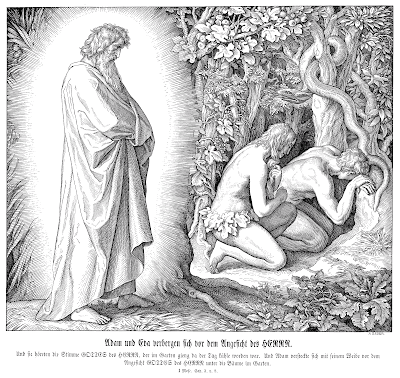 |
| Fr. Robert Barron [courtesy Wikimedia Commons] |
After this promising start, Fr. Barron lays out a traditional understanding of the tree of knowledge of good and evil:
The tree in question is identified as the tree of “the knowledge of good and evil,” which is to say, a form of knowing that is the unique prerogative of God. Since God is himself the unconditioned good, he alone is the criterion of what is morally right and wrong. According to the semeiotics of this story, therefore, the eating of the fruit of the forbidden tree is the act of arrogating to oneself what belongs in a privileged way to God. It is to make of the human will itself the criterion of good and evil, and from this subtle move, on the Biblical reading, misery has followed as surely as night follows the day.This traditional interpretation – which Fr. Barron is merely relating – understands “the knowledge of good and evil” as divine knowledge that is proper only to God. To acquire such divine knowledge, therefore, is to attempt to make one’s self like God. This understanding further confines “the knowledge of good and evil” to the moral sphere; humans will now decide for themselves what is morally right and wrong.
There are problems with the moral interpretation. For one, why would God have denied them an understanding of right and wrong? Without an understanding of right and wrong, Adam and Eve were morally ignorant before they ate from the tree. How then could God hold them at fault for disobeying his command when they would not have known the difference between right and wrong?
The moral interpretation also doesn’t fit other uses of the term in the rest of the Bible. For example, Deut 1:39, referring to the generation that will live to enter the promised land, says: “And your children, who as yet do not know good from evil – they shall enter there.” According the parallel passage in Num 14:29f, the children who “do not know good from evil” are those under 20 years of age. Being able to discern the good from bad requires wisdom that only comes with age and experience. Once acquired, it makes a person responsible for his or her own decisions. That person is then counted as an adult.
At the other end of the spectrum is 2 Sam 19:36. In this passage, Barzillai explains to King David why he cannot go with him to live in Jerusalem: “I am now eighty years old. Can I distinguish between good and evil? Can your servant taste what he eats and drinks, or still hear the voices of men and women singers?” Barzillai is obviously a mature adult and has experienced life, but he no longer experiences life to its fullness. His senses of taste and hearing are diminished so he lacks the capacity to discern between good and bad food, wine or song. Distinguishing between good and bad does not only mean making moral judgments.
Other ancient texts offer parallels. In the Babylonian Epic of Gilgamesh, Enkidu was naked and hairy and lived in the wild with the beasts. Trappers, upset that Enkidu was ruining their livelihood by letting the animals escape, hire a temple prostitute to tame him. Shamhat presents herself to Enkidu and they make love for six days and seven nights. Satisfied at last, Enkidu finds that the wild beasts now run away from him. Returning to Shamhat, she explains, “You are wise, Enkidu, and now you have become like a god.” She clothes him, introduces him to bread and wine, and brings him to the city of Uruk where he becomes friends with its king, Gilgamesh, and they have many adventures. There are similar themes at work in both tales. Knowledge makes a human like a god. And, once they become wise, humans can no longer live naked with wild animals, but must clothe themselves and live a civilized life.
 |
|
“God Confronts Adam and Eve” by Julius Schnorr von
Carolsfeld (1794-1872) [Courtesy of the Digital Image Archive, Pitts Theology
Library, Candler School of Theology, Emory University]
|
It is important to keep in mind that Genesis 2-3 is describing a primeval event, not a historical episode. The author is trying to explain why it is that our lives on earth are full of suffering, toil and sin, ending in death. If God had intended things differently, the author reasons, then something must have happened that caused human beings to be alienated from God and suffering, toil and sin were the result. Death will claim us in the end, but in the meantime there’s no limit to what we can accomplish if we put our minds to it. We have no choice but to live and learn.
No comments:
Post a Comment